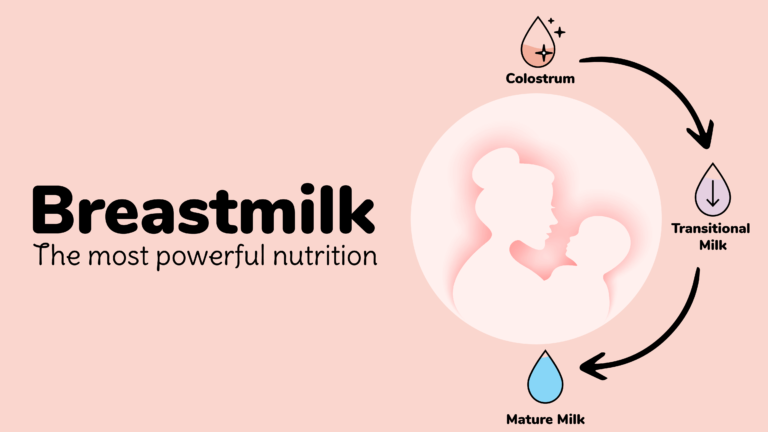Does Breastfeeding Boost Baby’s Immune System?

As a new parent, you want to give your baby the best start. This includes supporting their immune system. Breastfeeding is often seen as a way to boost a baby’s immune system. But does it really work?
Research shows that breastfeeding can positively impact a baby’s health. Breast milk provides essential antibodies that fight infection. Studies also show that breastfed babies have a lower risk of certain diseases. This makes breastfeeding key for a baby’s health and immune system development.
We will explore the world of breast milk and its amazing properties. We’ll look at how it protects babies from infections and diseases. We’ll cover the essential components of breast milk and the long-term benefits of breastfeeding. This will help us understand how breastfeeding supports a baby’s immune system.
Introduction to Breastfeeding and Immune System
It’s important to understand the link between breastfeeding and a baby’s immune system. By looking at the scientific evidence, we can see how breastfeeding boosts a baby’s immune system. This knowledge helps us make informed decisions about our baby’s health.
Key Findings on Breastfeeding and Immune System
Recent studies have shown the benefits of breastfeeding for a baby’s immune system. For example, breastfed babies have nearly twice as many regulatory T cells at three weeks old compared to formula-fed babies. This shows breastfeeding’s significant impact on a baby’s immune system, early in life.
Key Takeaways
- Breastfeeding provides essential antibodies that help fight infection and support a baby’s immune system.
- Breast milk contains proteins, fats, sugars, antibodies, and probiotics that support the baby’s immune system and overall health.
- Regulatory T cells were nearly twice as abundant in breastfed babies at three weeks of age compared to formula-fed babies.
- Breastfeeding can lower the risk of certain diseases and support a baby’s overall health and immune system development.
- An infant’s immune system matures between two and three months old, making breastfeeding a critical support during this period.
- Exposure to germs helps babies develop new antibodies for future protection. It’s recommended to limit a baby’s exposure to outside contacts during the first two months to reduce viral infection risk.
Understanding Your Baby’s Developing Immune System
The infant immune system is very important for keeping babies safe from sickness. As a parent, knowing how it works helps you take good care of your child. The natural defenses of a baby’s immune system are shaped by things like the gut microbiome. Breastfeeding plays a big role in this.
Studies have found that breastfed babies have different gut bacteria than non-breastfed ones. This can affect how their infant immune system grows. For example, breastfed babies at one and six months have different gut bacteria. This might help them fight off infections better. Also, breastfed babies at one month are less likely to be allergic to pets.
Babies go through times when they are more at risk for getting sick. It’s important to take extra steps to help their infant immune system during these times. Things like a mother’s race, a baby’s birth age, and exposure to smoke can affect their gut bacteria. This makes them more vulnerable.
To understand the infant immune system and its natural defenses, consider these points:
- Gut microbiome composition and its impact on the infant immune system
- The role of breastfeeding in shaping the natural defenses of a baby’s immune system
- Vulnerability periods in early life and how to provide extra care and protection during these times
The Science Behind Breast Milk Composition
The breast milk composition is a mix of nutrients, antibodies, and bioactive molecules. It gives babies the best nutrition and protects them from infections. The science behind breast milk shows it has hundreds to thousands of unique molecules. These help in growing strong immune systems and developing organs.
Studies have found that breast milk has proteins, fats, sugars, and white blood cells. These fight infections in many ways. Newborns have a weak immune system at first. But, the antibodies in colostrum protect them in the first 2–4 days of breastfeeding.
- Maternal immune cells, such as myeloid precursor cells, dendritic cells, and macrophages
- Antibodies and immunoglobulins that provide immune protection
- Growth factors that aid in organ development and maturation
Knowing the science behind breast milk helps us see how vital breastfeeding is. It supports the health and growth of babies. By looking at the breast milk composition, we learn how it helps infants thrive.
Essential Immune-Boosting Components in Breast Milk
Breast milk has special parts that help keep babies safe from germs and sickness. It has antibodies, white blood cells, and other important factors. These work together to support the baby’s immune system.
Antibodies are a key part of breast milk. They are proteins that fight off infections by finding and sticking to specific germs. The antibodies in breast milk, like immunoglobulin A (IgA), protect the gut and respiratory tract from infections.
Breast milk also has white blood cells. These cells, like macrophages and neutrophils, help destroy germs. This helps babies grow a strong immune system.
There are also growth factors in breast milk. These help the baby’s immune system grow and develop. All these components together help keep babies safe from infections and diseases.
Does Breastfeeding Really Boost Baby’s Immune System?
Research shows that breastfeeding boosts a baby’s immune system. It has long-term health benefits. Breast milk has antibodies that fight infections. This is key in protecting babies from diseases, mainly in early life.
Studies found that breastfeeding for 6+ months lowers the risk of childhood leukemia and lymphoma. It also reduces infections like ear infections and pneumonia. The benefits of breastfeeding last beyond infancy, supporting a healthy gut and reducing chronic health risks.
Some key benefits of breastfeeding for baby’s health include:
- Lower rates of infections and diseases
- Reduced risk of childhood leukemia and lymphoma
- Support for a healthy gut microbiome
- Lower risk of chronic health conditions
The evidence is clear: breastfeeding is vital for a baby’s immune system. It offers many health benefits for both the short and long term. By supporting a healthy immune system, breastfeeding protects babies from infections and diseases. This sets them up for a lifetime of health and wellbeing.
How Breast Milk Adapts to Protect Your Baby
Breast milk changes over time to meet your baby’s needs. This breast milk adaptation is key in shielding the baby from environmental factors and specific illnesses. As your baby grows, the milk’s composition adjusts to offer the right antibodies, vitamins, and minerals.
Studies reveal that breast milk is packed with antibodies, most in colostrum. This is the milk produced right after birth and in the first few days. These antibodies guard against specific illnesses and infections. Also, when a baby is sick, the white blood cells in the milk go up, giving extra defense.

The advantages of breast milk’s adaptability are vast. For instance, breastfeeding for 6 months can cut the risk of upper respiratory viruses by 35%. It also lowers the chance of babies becoming overweight or obese. The World Health Organization suggests breastfeeding for the first 6 months and then adding supplements for up to 2 years or more.
Some major perks of breast milk adaptation include:
- Protection against serious SARS-CoV-2 (COVID-19)
- Reduced risk of respiratory tract infections
- Lower likelihood of developing early onset inflammatory bowel disease (IBD)
- Decreased risk of childhood leukemia
Immediate Benefits for Your Baby’s Health
Breastfeeding gives many immediate benefits to a baby’s health. It lowers the risk of some diseases and infections. The American Academy of Pediatrics says exclusive breastfeeding for 6 months can help. It can reduce the risk of respiratory tract infections, ear infections, and diarrhea.
Some key immediate benefits of breastfeeding for a baby’s health include:
- Lower risk of middle ear infections
- Reduced risk of respiratory tract infections
- Lower risk of gut infections
- Reduced risk of sudden infant death syndrome (SIDS)
Breastfed babies also have more good gut bacteria. This can help with fat storage and overall health. The World Health Organization suggests breastfeeding until at least 2 years old for the best health.
In conclusion, breastfeeding has many immediate benefits for a baby’s health. It’s a key part of caring for an infant. By breastfeeding, mothers give their babies a great start in life. This sets them up for a lifetime of health and well-being.
Long-term Impact on Immune Development
Breastfeeding has a big long-term impact on immune development. It helps protect against future diseases. It may also lower the chance of allergies and autoimmune conditions. Studies show that breastfeeding changes the baby’s immune system. This can affect their long-term health outcomes.
Some key benefits of breastfeeding for immune development are:
- Reduced risk of overweight and obesity, type 2 diabetes, and other chronic diseases
- Lower levels of proinflammatory cytokines, which can contribute to future diseases
- Improved thymus gland development, which is essential for the production of mature T cells
A study found that exclusively breastfed infants have bigger thymus glands. This is compared to those who are partially breastfed or formula-fed. This shows how important breastfeeding is for immune development. Also, breastfeeding is linked to a lower risk of future diseases. This includes type 1 diabetes and rheumatoid arthritis.
Comparing Breast Milk to Formula
Choosing how to feed your baby is a big decision. You might wonder if to use breast milk or formula. Both have their good points and not-so-good points. Breast milk is seen as the best for babies because it has important nutrients and antibodies.
Formula is made to be a good alternative but it’s not the same as breast milk. The World Health Organization says breast milk is mostly water, with some fat, protein, and lactose. Formula, on the other hand, has to have the right amounts of water, carbs, protein, fat, vitamins, and minerals.
Breast milk has special antibodies that help keep babies healthy. Formula can help too, but it can’t match breast milk’s unique benefits. Here’s a table showing some key differences:
| Nutrient | Breast Milk | Formula |
|---|---|---|
| Water | 87% | Varies |
| Fat | 3.8% | Varies |
| Protein | 1.0% | Varies |
| Lactose | 7% | Varies |
Choosing between breast milk and formula depends on your situation. Breast milk is the best choice, but formula is okay if you can’t or don’t want to breastfeed. Knowing the differences helps you make a choice that’s right for you and your baby.
Supporting Your Breastfeeding Journey
Starting your breastfeeding journey means keeping a healthy diet. This ensures you give your baby the best nutrition. Eating fruits, vegetables, whole grains, and lean proteins helps your milk production and health.
Maintaining a Healthy Diet While Breastfeeding
Eating well is key for a good breastfeeding experience. Choose whole foods over processed and sugary snacks. Drink lots of water and add foods like oats, leafy greens, and nuts to your meals.
Managing Common Challenges
Even with breastfeeding’s benefits, you might face issues like latching problems, sore nipples, or low milk supply. If you need help, talk to a lactation consultant or your doctor. With the right support, you can overcome these hurdles and keep feeding your baby breast milk.
When Additional Immune Support May Be Needed
In some cases, babies need extra help to stay healthy. This is true for premature babies or those with medical issues. Healthcare providers help figure out the best way to give them this extra support.
Babies with certain health problems or who have had surgery may get sick easier. It’s important to talk to healthcare providers about how to help their immune system. They might suggest supplements or other ways to boost their health.
The American Academy of Pediatrics says premature babies need careful monitoring. They should see healthcare providers often to check on their immune system. This helps ensure they get the support they need.
Every baby is different, and how their immune system grows can vary. By working with healthcare providers and giving extra support when it’s needed, parents can help their babies thrive.
Building a Strong Foundation for Lifelong Health
Breastfeeding gives babies a special mix of vitamins, minerals, and antioxidants. This breastmilk is key for their growth and health. It boosts their immune systems and helps fight off many illnesses.
Research shows breastfeeding lowers the risk of diseases like otitis media and obesity. It may also boost intelligence quotient (IQ) in kids. The longer a baby is breastfed, the better their health and well-being.
Parents who choose breastfeeding give their kids a strong start in life. The World Health Organization says to breastfeed exclusively for six months. Then, add solid foods while continuing to breastfeed up to 2 years or more. This sets a strong foundation for a healthy future.






